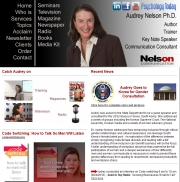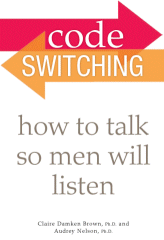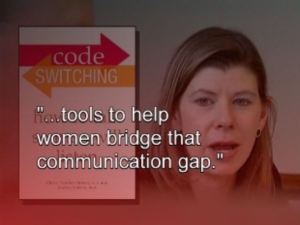Women Should be Seen, Not heard
About a year ago I was invited to be the “guest expert” on gender communication for the Psychology Today blog. My most recent posting Speak Up! Women and How they Say Things received interesting responses. The article dealt with women’s voices including volume, length of responses, etc. Here is an excerpt from the article (I encourage you to visit Psychology Today to view the entire article):
Women communicate a level of authenticity through the expressive variation of their vocal cues. They can demonstrate real sincerity, show their true feelings, and exhibit empathy in what they say. The variation inherent in the female voice conveys charisma. This is a great asset for public speaking. Women also talk to bond and connect, to fill up the empty space in order to make others feel more comfortable. Indeed, filling the silence can increase the comfort level for everyone, including the women themselves! If we don't have a good comfort level, we don't have good communication-our interactions become strained and forced. Women engage in "relationship talk" (classically called "chit-chat") to help them warm up and ease the conversation into an easy, spontaneous flow.
Here are some of the responses and my feedback
- 1) I don't think it's just me. Part of the difficulty I have in absorbing some women's spoken or written communication has to do with the sheer volume of it. In almost all situations I am simply trying to hold up my end of the exchange. I need to know whether the person would like support, information, suggestions, reflection or something else. Unfortunately I often have to review the input repeatedly in an effort to understand what the other person's state of mind is. Of course at the opposite extreme I have to be prepared to spend hours dragging communication out of men.
My response:
One of the common criticisms of women’s speech is they go on and on. Also, many studies have been conducted regarding the number of words (much greater) women use compared to men. And, yes, on the other end of the spectrum are men who you may need to “pull information” from; they often speak in a more abbreviated style.
- 2) Agreed that men may generally present a more "goal-oriented" and 'assertive'
front, but they're also often less clear about the emotional underpinnings
of what they're saying, and especially about what's important to them and what they really want.
Women not so much, though they do seem to require more
of a "process"
(discussions, meetings, consensus, whatever) to actually arrive at the "decision" (even though it's obvious they've already made up their minds).
And yes, voice and speaking style are important "persuaders", but no more than confidence, empathy, salesmanship, vision, and a host of other qualities that aren't "gender-exclusive" (not withstanding the tired old excuses of "social-conditioning").
|
|
Audrey Nelson PhD. is an international trainer, consultant and author who works with organizations to increase their productivity and profitability thorough winning communication strategies.
You can reach Audrey at audrey@audreynelson.com
or at 303.448.1800 O or 303.448.1802 C.
|
Have you checked out Audrey’s blog on

Did you know that Audrey was invited by the editors at Psychology Today to participate as a gender communication expert on the Psychology Today blog . Check it out!
Current Article
From birth to death and all occasions in between, the eyes have it. While women and men differ in their eye behavior and what that behavior means, eye contact is the strongest form of nonverbal communication. Read More
|
|
Coming soon |
Denver Tech Center Colorado Business Women
dtccbwnews@gmail.com
Wednesday March 9, 2011 from 11 am to 1 pm
Code switching: How to talk so Men will Listen -
Maggiano’s DTC |
|
Did
you miss one of the
Smart Talk Columns? |
Browse
the archives of Audrey’s 2006 to date
Smart Talk Columns on her web!
Simply visit www.audreynelson.com
and click on “Newsletters.”
|
|
Audrey Goes to
Korea for Gender Consultation

Click here for complete story and pictures
 Audrey was asked by the State Department to be a guest speaker and consultant for the US Embassy in Seoul, South Korea. She addressed a variety of groups including the Korean Supreme Court, The National Assembly, Korean media and a variety of women advocacy groups. Audrey was asked by the State Department to be a guest speaker and consultant for the US Embassy in Seoul, South Korea. She addressed a variety of groups including the Korean Supreme Court, The National Assembly, Korean media and a variety of women advocacy groups.
Dr. Audrey Nelson addressed how enhancing inclusion through critical gender relationships and cultural awareness can leverage South Korea’s female talent pool. An exploration of the difference between simply recognizing male-female diversity and leading with a full understanding of how inclusion can benefit business will be the focus. A fuller understanding of workplace dynamics that undermine the full participation of women and a deeper awareness of how differently men and women communicate is necessary in order to prevent these gender differences from leading to resentment, decreased productivity and workplace stress.
|
 Audrey conducted an interview on Code switching 9 am to 10 am (9/24/2010) - Seed to Sky Radio, "Growing Businesses Small to Tall" Audrey conducted an interview on Code switching 9 am to 10 am (9/24/2010) - Seed to Sky Radio, "Growing Businesses Small to Tall"

 Audrey was interview on the 'Everyday Show" with Natalie and Chris on Channel CW2 on the topic -
How to Deal with People You Hate - KWGN-TV, Denver Audrey was interview on the 'Everyday Show" with Natalie and Chris on Channel CW2 on the topic -
How to Deal with People You Hate - KWGN-TV, Denver
 Code Switching gets in the Top Selling Women’s Magazine in US. See Cosmopolitan magazine's September 2010 issue and Audrey "Read His (Sexy) Lips" p. 75. Code Switching gets in the Top Selling Women’s Magazine in US. See Cosmopolitan magazine's September 2010 issue and Audrey "Read His (Sexy) Lips" p. 75.
On stands now!-
|
|








 Audrey was asked by the State Department to be a guest speaker and consultant for the US Embassy in Seoul, South Korea. She addressed a variety of groups including the Korean Supreme Court, The National Assembly, Korean media and a variety of women advocacy groups.
Audrey was asked by the State Department to be a guest speaker and consultant for the US Embassy in Seoul, South Korea. She addressed a variety of groups including the Korean Supreme Court, The National Assembly, Korean media and a variety of women advocacy groups.

